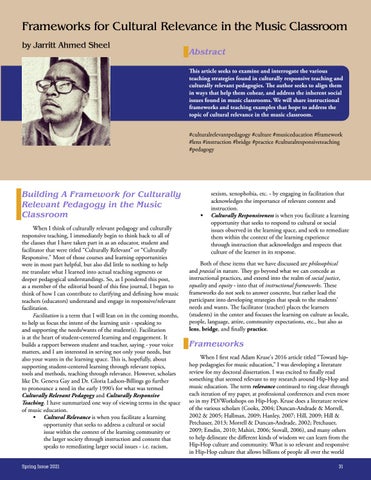Frameworks for Cultural Relevance in the Music Classroom by Jarritt Ahmed Sheel
Abstract This article seeks to examine and interrogate the various teaching strategies found in culturally responsive teaching and culturally relevant pedagogies. The author seeks to align them in ways that help them cohear, and address the inherent social issues found in music classrooms. We will share instructional frameworks and teaching examples that hope to address the topic of cultural relevance in the music classroom. #culturalrelevantpedagogy #culture #musiceducation #framework #lens #instruction #bridge #practice #culturalresponsiveteaching #pedagogy
Building A Framework for Culturally Relevant Pedagogy in the Music Classroom When I think of culturally relevant pedagogy and culturally responsive teaching, I immediately begin to think back to all of the classes that I have taken part in as an educator, student and facilitator that were titled “Culturally Relevant” or “Culturally Responsive.” Most of those courses and learning opportunities were in most part helpful, but also did little to nothing to help me translate what I learned into actual teaching segments or deeper pedagogical understandings. So, as I pondered this post, as a member of the editorial board of this fine journal, I began to think of how I can contribute to clarifying and defining how music teachers (educators) understand and engage in responsive/relevant facilitation. Facilitation is a term that I will lean on in the coming months, to help us focus the intent of the learning unit - speaking to and supporting the needs/wants of the student(s). Facilitation is at the heart of student-centered learning and engagement. It builds a rapport between student and teacher, saying - your voice matters, and I am interested in serving not only your needs, but also your wants in the learning space. This is, hopefully, about supporting student-centered learning through relevant topics, tools and methods, teaching through relevance. However, scholars like Dr. Geneva Gay and Dr. Gloria Ladson-Billings go further to pronounce a need in the early 1990’s for what was termed Culturally Relevant Pedagogy and Culturally Responsive Teaching. I have summarized one way of viewing terms in the space of music education. • Cultural Relevance is when you facilitate a learning opportunity that seeks to address a cultural or social issue within the context of the learning community or the larger society through instruction and content that speaks to remediating larger social issues - i.e. racism,
•
sexism, xenophobia, etc. - by engaging in facilitation that acknowledges the importance of relevant content and instruction. Culturally Responsiveness is when you facilitate a learning opportunity that seeks to respond to cultural or social issues observed in the learning space, and seek to remediate them within the context of the learning experience through instruction that acknowledges and respects that culture of the learner in its response.
Both of these items that we have discussed are philosophical and praxial in nature. They go beyond what we can concede as instructional practices, and extend into the realm of social justice, equality and equity - into that of instructional frameworks. These frameworks do not seek to answer concrete, but rather lead the participant into developing strategies that speak to the students' needs and wants. The facilitator (teacher) places the learners (students) in the center and focuses the learning on culture as locale, people, language, attire, community expectations, etc., but also as lens, bridge, and finally practice.
Frameworks When I first read Adam Kruse's 2016 article titled “Toward hiphop pedagogies for music education,” I was developing a literature review for my doctoral dissertation. I was excited to finally read something that seemed relevant to my research around Hip-Hop and music education. The term relevance continued to ring clear through each iteration of my paper, at professional conferences and even more so in my PD/Workshops on Hip-Hop. Kruse does a literature review of the various scholars (Cooks, 2004; Duncan-Andrade & Morrell, 2002 & 2005; Hallman, 2009; Hanley, 2007; Hill, 2009; Hill & Petchauer, 2013; Morrell & Duncan-Andrade, 2002; Petchauer, 2009; Emdin, 2010; Mahiri, 2006; Stovall, 2006), and many others to help delineate the different kinds of wisdom we can learn from the Hip-Hop culture and community. What is so relevant and responsive in Hip-Hop culture that allows billions of people all over the world
Spring Issue 2021
31

